Related Research Articles
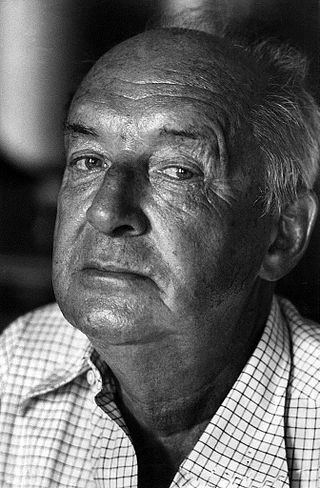
Vladimir Vladimirovich Nabokov, also known by the pen name Vladimir Sirin, was an expatriate Russian and Russian-American novelist, poet, translator, and entomologist. Born in Imperial Russia in 1899, Nabokov wrote his first nine novels in Russian (1926–1938) while living in Berlin, where he met his wife. He achieved international acclaim and prominence after moving to the United States, where he began writing in English. Nabokov became an American citizen in 1945 and lived mostly on the East Coast before returning to Europe in 1961, where he settled in Montreux, Switzerland.
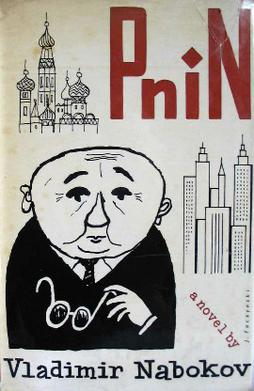
Pnin is Vladimir Nabokov's 13th novel and his fourth written in English; it was published in 1957. The success of Pnin in the United States launched Nabokov's career into literary prominence. Its eponymous protagonist, Timofey Pavlovich Pnin, is a Russian-born assistant professor in his 50s living in the United States, whose character is believed to be based partially on the life of both Nabokov's colleague Marc Szeftel as well as on Nabokov himself. Exiled by the Russian Revolution and what he calls the "Hitler war", Pnin teaches Russian at the fictional Waindell College, loosely inspired by Cornell University and Wellesley College—places where Nabokov himself taught.
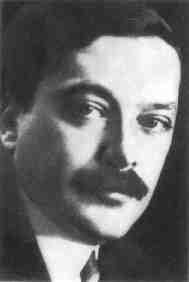
Mark Aldanov was a Russian and later French writer and critic, known for his historical novels.

The Gift is Vladimir Nabokov's final Russian novel, and is considered to be his farewell to the world he was leaving behind. Nabokov wrote it between 1935 and 1937 while living in Berlin, and it was published in serial form under his pen name, Vladimir Sirin.
M. Ageyev was the pen name of the writer of the Russian Novel with Cocaine. He is believed to be Mark Lazarevich Levi.

Novel with Cocaine is a novel first published in 1934 in a Russian émigré literary magazine Chisla (Numbers) under a pen name M. Ageyev. The English translation of the title fails to convey the double meaning of the Russian "Роман," meaning both "novel" and "romance".
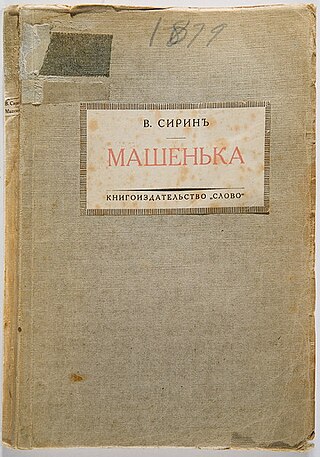
Mary is the debut novel by Vladimir Nabokov, first published under the pen name V. Sirin in 1926 by Russian-language publisher "Slovo".
The Real Life of Sebastian Knight is the first English-language novel by Vladimir Nabokov, written from late 1938 to early 1939 in Paris and first published in 1941. A work centred on language and its inability to convey any satisfactory definition, it has been identified as a forerunner of the postmodernist novel.

The Defense is the third novel written by Vladimir Nabokov after he had immigrated to Berlin. It was first published in Russian 1930 and later in English in 1964.
The Eye, written in 1930, is Vladimir Nabokov's fourth novel. It was translated into English by the author's son Dmitri Nabokov in 1965.
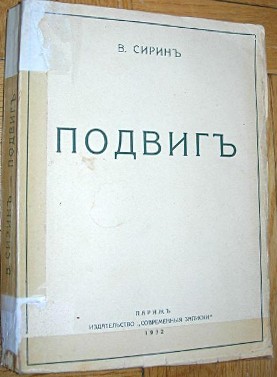
Glory is a Russian novel written by Vladimir Nabokov between 1930 and 1932 and first published in Paris.
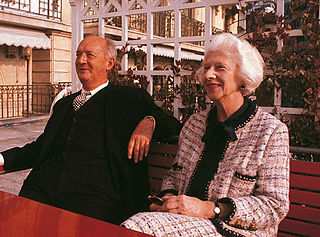
Véra Yevseyevna Nabokova was the wife, editor, and translator of Russian writer Vladimir Nabokov, and a source of inspiration for many of his works.

A Russian Beauty and Other Stories is a collection of thirteen short stories by Russian author Vladimir Nabokov. The short stories in this collection were originally written in Russian between 1927 and 1940 under the pseudonym Vladimir Sirin. Before being collated into short story collections, some were published by various European Russian émigré newspapers and magazines.
"The Potato Elf" is a short story written in Russian by Vladimir Nabokov in Berlin where it was first published in the émigré daily Rul in 1929 and then included in 1929 collection Vozvrashchenie Chorba. It was initially translated into English by Serge Bertensen and Irene Kosinska for publication in Esquire in 1939, and reprinted in A Single Voice. Nabokov then retranslated the story and included it in A Russian Beauty and Other Stories in 1973.
"The Return of Chorb" is a short story by Vladimir Nabokov written in Russian under his pen name Vladimir Sirin in Berlin in 1925. In 1929 it became part of a collection of fifteen short stories and twenty-four poems also called The Return of Chorb in Russian by "V. Sirin".
This is a list of works by writer Vladimir Nabokov.

Lolita is a 1955 novel written by Russian-American novelist Vladimir Nabokov that addresses the controversial subject of hebephilia. The protagonist is a French literature professor who moves to New England and writes under the pseudonym Humbert Humbert. He describes his obsession with a 12-year-old "nymphet", Dolores Haze, whom he kidnaps and sexually abuses after becoming her stepfather. Privately, he calls her "Lolita", the Spanish nickname for Dolores. The novel was originally written in English, but fear of censorship in the U.S. and Britain led to it being first published in Paris, France, in 1955 by Olympia Press.

The Man from the USSR and Other Plays is a collection of four dramas by the Russian writer Vladimir Nabokov, first published in 1984. The plays were collected and translated from the original Russian by Nabokov's son, Dmitri Nabokov after his father's death. The volume consists of the plays 'The Pole', 'The Man from the USSR', 'The Event' and 'The Granddad' ('Dedushka').

The Tragedy of Mister Morn is a verse drama by Russian novelist Vladimir Nabokov. The play is one of his first major works.
Mark Lvovich Slonim was a Russian politician, literary critic, scholar and translator. He was a lifelong member of the Socialist Revolutionary Party, and, in 1917, served as its deputy for Bessarabia in the Russian Constituent Assembly. He joined the Samara Government during the early phases of the Civil War, opposing both the Bolsheviks and the conservative elements of the White movement. Assigned to his party's Foreign Delegation, Slonim lobbied unsuccessfully for the return of Bessarabia to Russia during the Paris Peace Conference. After a short stay in Tuscany, he settled in Czechoslovakia in 1922, an editor of Volya Rossii review.
References
- 1 2 Akikusa, Shun'ichiro (2006). "The Vanished Cane and the Revised Trick: A Solution for Nabokov's "Lips to Lips"". Nabokov Studies. 10 (1): 99–120. doi:10.1353/nab.2007.0000. ISSN 1548-9965. S2CID 145546874.
- ↑ Frank, Siggy (2012-01-12). Nabokov's Theatrical Imagination. Cambridge University Press. p. 152. ISBN 978-1-107-01545-6.
- ↑ Alexandrov, Vladimir E. (2014-05-22). The Garland Companion to Vladimir Nabokov. Routledge. pp. 459–460, 485. ISBN 978-1-136-60157-6.
- ↑ Bethea, David; Frank, Siggy (2018-05-24). Vladimir Nabokov in Context. Cambridge University Press. p. 46. ISBN 978-1-108-67617-5.